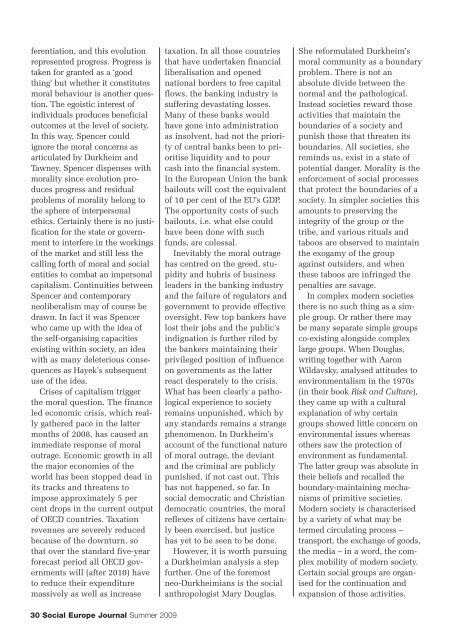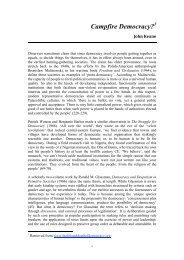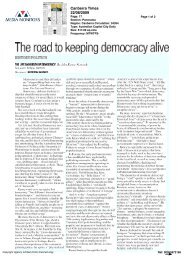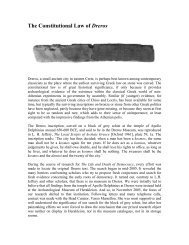The Ethics of Capitalism - Social Europe Journal
The Ethics of Capitalism - Social Europe Journal
The Ethics of Capitalism - Social Europe Journal
You also want an ePaper? Increase the reach of your titles
YUMPU automatically turns print PDFs into web optimized ePapers that Google loves.
ferentiation, and this evolution<br />
represented progress. Progress is<br />
taken for granted as a ‘good<br />
thing’ but whether it constitutes<br />
moral behaviour is another question.<br />
<strong>The</strong> egoistic interest <strong>of</strong><br />
individuals produces beneficial<br />
outcomes at the level <strong>of</strong> society.<br />
In this way, Spencer could<br />
ignore the moral concerns as<br />
articulated by Durkheim and<br />
Tawney. Spencer dispenses with<br />
morality since evolution produces<br />
progress and residual<br />
problems <strong>of</strong> morality belong to<br />
the sphere <strong>of</strong> interpersonal<br />
ethics. Certainly there is no justification<br />
for the state or government<br />
to interfere in the workings<br />
<strong>of</strong> the market and still less the<br />
calling forth <strong>of</strong> moral and social<br />
entities to combat an impersonal<br />
capitalism. Continuities between<br />
Spencer and contemporary<br />
neoliberalism may <strong>of</strong> course be<br />
drawn. In fact it was Spencer<br />
who came up with the idea <strong>of</strong><br />
the self-organising capacities<br />
existing within society, an idea<br />
with as many deleterious consequences<br />
as Hayek’s subsequent<br />
use <strong>of</strong> the idea.<br />
Crises <strong>of</strong> capitalism trigger<br />
the moral question. <strong>The</strong> finance<br />
led economic crisis, which really<br />
gathered pace in the latter<br />
months <strong>of</strong> 2008, has caused an<br />
immediate response <strong>of</strong> moral<br />
outrage. Economic growth in all<br />
the major economies <strong>of</strong> the<br />
world has been stopped dead in<br />
its tracks and threatens to<br />
impose approximately 5 per<br />
cent drops in the current output<br />
<strong>of</strong> OECD countries. Taxation<br />
revenues are severely reduced<br />
because <strong>of</strong> the downturn, so<br />
that over the standard five-year<br />
forecast period all OECD governments<br />
will (after 2010) have<br />
to reduce their expenditure<br />
massively as well as increase<br />
taxation. In all those countries<br />
that have undertaken financial<br />
liberalisation and opened<br />
national borders to free capital<br />
flows, the banking industry is<br />
suffering devastating losses.<br />
Many <strong>of</strong> these banks would<br />
have gone into administration<br />
as insolvent, had not the priority<br />
<strong>of</strong> central banks been to prioritise<br />
liquidity and to pour<br />
cash into the financial system.<br />
In the <strong>Europe</strong>an Union the bank<br />
bailouts will cost the equivalent<br />
<strong>of</strong> 10 per cent <strong>of</strong> the EU's GDP.<br />
<strong>The</strong> opportunity costs <strong>of</strong> such<br />
bailouts, i.e. what else could<br />
have been done with such<br />
funds, are colossal.<br />
Inevitably the moral outrage<br />
has centred on the greed, stupidity<br />
and hubris <strong>of</strong> business<br />
leaders in the banking industry<br />
and the failure <strong>of</strong> regulators and<br />
government to provide effective<br />
oversight. Few top bankers have<br />
lost their jobs and the public’s<br />
indignation is further riled by<br />
the bankers maintaining their<br />
privileged position <strong>of</strong> influence<br />
on governments as the latter<br />
react desperately to the crisis.<br />
What has been clearly a pathological<br />
experience to society<br />
remains unpunished, which by<br />
any standards remains a strange<br />
phenomenon. In Durkheim’s<br />
account <strong>of</strong> the functional nature<br />
<strong>of</strong> moral outrage, the deviant<br />
and the criminal are publicly<br />
punished, if not cast out. This<br />
has not happened, so far. In<br />
social democratic and Christian<br />
democratic countries, the moral<br />
reflexes <strong>of</strong> citizens have certainly<br />
been exercised, but justice<br />
has yet to be seen to be done.<br />
However, it is worth pursuing<br />
a Durkheimian analysis a step<br />
further. One <strong>of</strong> the foremost<br />
neo-Durkheimians is the social<br />
anthropologist Mary Douglas.<br />
She reformulated Durkheim’s<br />
moral community as a boundary<br />
problem. <strong>The</strong>re is not an<br />
absolute divide between the<br />
normal and the pathological.<br />
Instead societies reward those<br />
activities that maintain the<br />
boundaries <strong>of</strong> a society and<br />
punish those that threaten its<br />
boundaries. All societies, she<br />
reminds us, exist in a state <strong>of</strong><br />
potential danger. Morality is the<br />
enforcement <strong>of</strong> social processes<br />
that protect the boundaries <strong>of</strong> a<br />
society. In simpler societies this<br />
amounts to preserving the<br />
integrity <strong>of</strong> the group or the<br />
tribe, and various rituals and<br />
taboos are observed to maintain<br />
the exogamy <strong>of</strong> the group<br />
against outsiders, and when<br />
these taboos are infringed the<br />
penalties are savage.<br />
In complex modern societies<br />
there is no such thing as a simple<br />
group. Or rather there may<br />
be many separate simple groups<br />
co-existing alongside complex<br />
large groups. When Douglas,<br />
writing together with Aaron<br />
Wildavsky, analysed attitudes to<br />
environmentalism in the 1970s<br />
(in their book Risk and Culture),<br />
they came up with a cultural<br />
explanation <strong>of</strong> why certain<br />
groups showed little concern on<br />
environmental issues whereas<br />
others saw the protection <strong>of</strong><br />
environment as fundamental.<br />
<strong>The</strong> latter group was absolute in<br />
their beliefs and recalled the<br />
boundary-maintaining mechanisms<br />
<strong>of</strong> primitive societies.<br />
Modern society is characterised<br />
by a variety <strong>of</strong> what may be<br />
termed circulating process –<br />
transport, the exchange <strong>of</strong> goods,<br />
the media – in a word, the complex<br />
mobility <strong>of</strong> modern society.<br />
Certain social groups are organised<br />
for the continuation and<br />
expansion <strong>of</strong> those activities.<br />
30 <strong>Social</strong> <strong>Europe</strong> <strong>Journal</strong> Summer 2009







